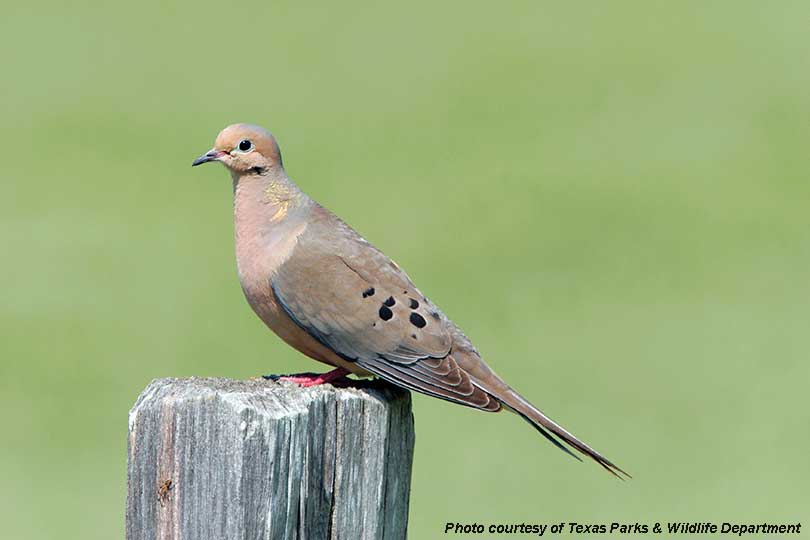By Justin Walker
Communications Specialist
Dove hunters across the state may have varying levels of success due to drought conditions this season, according to Texas A&M AgriLife Extension Service experts.
While Texas hunters should see plenty of dove this year, the birds’ access to food and water will impact parts of the state.
Dr. Maureen Frank, AgriLife Extension wildlife specialist, said dove typically adjust well during periods of drought, moving from one area to another in search of food and water. But this movement will affect hunter success in various parts of Texas.
Frank said dove are not as impacted by drought as quail, which depend on insects and native forbs to survive. Dove can get by on agricultural crops, such as sesame, sunflowers and sorghum.
“Dove populations are much more stable than quail because they utilize agricultural fields,” she said in an interview with AgriLife Today.
Owen Fitzsimmons, Texas Parks and Wildlife Department (TPWD) dove program leader, said there was excellent production of mourning doves very early in the spring despite dry conditions this summer. A mild winter and good rains resulted in a lot of birds.
“The drought this summer might have affected some of the late hatch, but I think in the early production we got evened things out,” Fitzsimmons said in an interview with the Texas Farm Bureau Radio Network.
The season opens Sept. 1 for North and Central Dove Zones. The first season runs through Nov. 4, with a second season running from Dec. 21, 2018 through Jan. 14, 2019.
South Dove Zone hunters can go every weekend in September, with a Sept. 14 zone opener. A second season will run from Dec. 14, 2018 through Jan. 21, 2019.
Hunters are required to have a state hunting license, which can be purchased through one of TPWD’s 28 field offices, at more than 50 state parks and at more than 1,700 retailers in Texas. Licenses are also available online.
Dr. John Tomecek, AgriLife Extension wildlife specialist, said that even with the good numbers, some parts of the state will see fewer birds because of the drought.
Commodity crop losses due to drought allowed for annual volunteer plants, such as sunflowers, to grow in place, Tomecek said. These areas, especially ones with water sources and roosts, will have an advantage this season.
“Birds will be moving between food and water sources as they make their way south,” he said. “Food and water are in short supply in a lot of areas, so the places that do have these, and trees to roost in, should hold a lot of birds.”
Tomecek warned hunters that while providing food sources could improve their chances, it could be against the law.
It is illegal to broadcast seed or grains before or during dove season to attract birds, he said. However, there are “normal agricultural operations” that are legal. Tomecek said the differences can be confusing.
“The best way to explain it is that if you put seed or grain on the ground this time of year, it’s likely illegal,” he said. “If you planted it and it is maturing during hunting season, you can manipulate it in any way to hunt over it throughout the season.”
Click here for more on the story and here for recommendations regarding “normal agricultural operations.”

